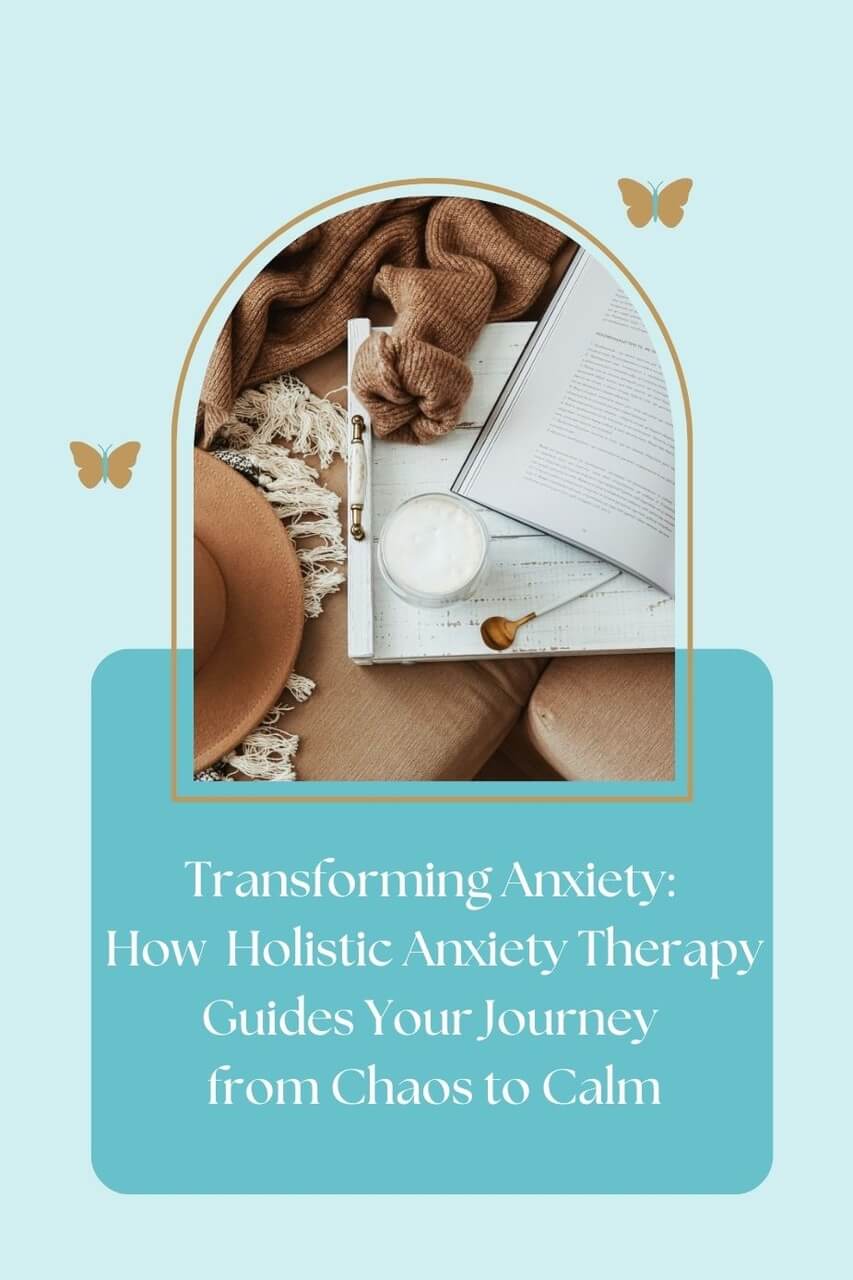Overcoming Anxiety: Embracing Calm Amidst the Chaos
Anxiety can feel overwhelming and often casts a shadow over even the brightest moments of our lives. However, it doesn’t have to control your life. At its core, anxiety is meant to keep us safe—it warns us of potential dangers, judgments, and rejections. However, anxiety doesn’t always function from a rational standpoint. Therefore, learning to address its concerns without letting it control our actions can be challenging. This blog will emphasize the importance of acknowledging anxiety’s presence while also developing a set of effective coping strategies to manage its more difficult aspects. By embracing anxiety rather than resisting it, you can transform it from a source of chaos into a pathway to calm. This guide explores evidence-based techniques and holistic anxiety therapy approaches for managing anxiety. Helping you reclaim your peace of mind, and living with renewed confidence and resilience.

Understanding Anxiety: Embrace It, Don’t Fight It
Anxiety is a natural response to stress, designed to alert us to potential threats. When anxiety becomes overwhelming and disrupts daily life, it can feel insurmountable. Embracing anxiety rather than fighting it can help you manage it more effectively. Here’s how:
1. Recognize and Accept Anxiety
The first step in transforming anxiety is to acknowledge and accept it. Recognizing anxiety as a part of your experience rather than an enemy reduces its intensity and helps you feel more in control. Acceptance fosters a more balanced approach to managing anxiety.
2. Understand the Causes and Triggers
Identifying what triggers your anxiety is crucial. By understanding the underlying causes, you can address them more effectively. This insight helps you make informed decisions about how to respond to anxiety and develop targeted coping strategies.
Is a Little Anxiety Good For Us?
A Paradox of Anxiety
It’s a paradox of life that sometimes the very things making us feel bad can also be beneficial. Research suggests that anxiety can have evolutionary roots. Developing as a response to challenging or stressful situations. While an anxiety disorder itself is not useful, certain aspects of anxiety can serve a purpose.
Embracing Anxious Feelings
Rather than fighting anxious feelings, consider embracing them. By shifting your attitude, you might find that anxious feelings can be harnessed for personal growth. Instead of panicking about your anxiety, explore how it might be beneficial.
Our Brain’s Attempt at Keeping Us Safe
Anxiety’s primary purpose is to alert us to potential risks. Recognizing this can help you manage anxiety more effectively. By understanding that anxiety is a signal to be cautious, you can use it to make safer decisions and better understand your needs.
Using Rational Mind
If you can use your rational mind to consider extreme anxiety, you might find that what remains is a helpful instinct. This suggests that anxiety can sometimes guide us toward better decisions.
Anxiety and Decision-Making
Decision-making can be a challenging process for many people with anxiety. They often find themselves analyzing every option, weighing the pros and cons repeatedly. While this thoroughness might seem overwhelming, it can actually be a valuable trait. Anxiety often drives individuals to carefully consider every angle before making a choice, leading to well-thought-out decisions.
Research supports this perspective. Anxiety can influence how we process information, making us more comprehensive in our evaluations. For instance, individuals with higher levels of anxiety might be better at scrutinizing various aspects of a situation and considering potential drawbacks, leading to more balanced and rational decision-making. This careful consideration can be advantageous, especially when making important decisions.
Research Supporting Anxiety’s Benefits
Studies indicate that people with higher levels of attachment anxiety often excel in protecting themselves and others. They are better at detecting deception and avoiding potential heartbreak. Additionally, anxiety can enhance motivation. Pushing individuals to perform better in various areas of life.
To effectively embrace and manage anxiety, it’s crucial to balance both top-down approaches, like rational thinking, and bottom-up approaches, such as tuning into your bodily sensations and emotions. This combined holistic perspective helps you understand, address, and embrace anxiety from all angles. Leading to a more holistic and balanced outcome.
The Role of Therapy in Embracing Anxiety
While self-help techniques are beneficial, therapy offers additional support. Therapists provide a safe and nurturing space to explore the root causes of anxiety and develop personalized coping strategies. With a holistic approach, anxiety therapists can introduce clients to various tools and techniques that promote emotional regulation and overall well-being.
- Exploring Underlying Causes: Therapy offers a safe space to uncover and address the root causes of anxiety.
- Developing Personalized Strategies: A therapist can help you create tailored coping strategies for effective anxiety management.
- Building Resilience: Therapy supports you in developing resilience and confidence in handling anxiety.
Practicing Emotional Agility: Building Resilience
Emotional agility involves recognizing and accepting your emotions without letting them control your actions. By embracing your feelings and adapting to changing circumstances, you can build resilience and respond effectively to challenges. This practice helps you manage anxiety by preventing emotional overwhelm and promoting a balanced approach to life’s stressors.
How Emotional Agility Creates Resilience
Emotional agility helps you bounce back from adversity and adapt to new situations. When you’re emotionally agile, you’re less likely to be overwhelmed by stress because you’ve learned to manage your emotions constructively.
Examples of Emotional Agility
- Acknowledging and Accepting Emotions
- Adapting to Change
Distress Tolerance: Managing Anxiety Effectively
Distress tolerance is the ability to endure and manage difficult emotions without becoming overwhelmed. Developing these skills helps you handle emotional pain and stress in a healthy way, reducing the intensity of anxiety and maintaining balance during challenging times.
Benefits of Distress Tolerance for Anxiety
Enhancing your distress tolerance helps you manage anxiety by enabling you to face stressful situations with composure. This reduces emotional reactions and prevents anxiety from escalating.
Examples of Distress Tolerance Techniques
- Mindful Breathing
- Self-Soothing
- Cognitive Restructuring

Feeling Safe in the Body: The Role of Holistic Approaches
While rational thinking plays a crucial role in understanding anxiety, it’s equally important to shift our focus to body-based approaches. By tuning into our physical sensations and emotional responses, we can gain a fuller perspective on anxiety and develop more effective strategies for managing it.
Anxiety often begins with physical symptoms that manifest in the body. To address these, it’s crucial to work on feeling safe and grounded within ourselves. This process may include learning techniques like meditation and mindfulness. These practices help individuals manage their emotions without becoming overwhelmed.
Understanding Holistic and Somatic Techniques
Holistic Approaches to Anxiety
Holistic therapy integrates various methods to help manage anxiety. These approaches consider the whole person, including physical, emotional, and mental aspects. Techniques like meditation and mindfulness are crucial in this context. But holistic anxiety therapy also includes practices such as deep breathing exercises, progressive muscle relaxation, and guided imagery.
Somatic Strategies for Managing Anxiety
Somatic strategies focus on the connection between the body and mind. Techniques such as body scans, yoga, and tai chi can help individuals become more aware of their physical sensations and manage anxiety effectively. These practices promote relaxation and help individuals feel more grounded.
Understanding How Mindfulness Can Help
Mindfulness is a powerful practice embraced by mental health professionals. At its core, mindfulness involves being fully present in the moment and acknowledging thoughts and feelings without judgment. In the context of anxiety, mindfulness becomes a transformative tool, allowing individuals to observe their anxious thoughts without becoming entangled in them.
1. Breaking the Cycle of Anxiety
Anxiety often thrives on anticipation and worry about the future or dwelling on the past. Mindfulness interrupts this cycle by redirecting attention to the present moment. Techniques like mindful breathing and body scans help individuals anchor themselves in the ‘now,’ breaking free from the grip of anxious thoughts and fostering a sense of calm.
2. Cultivating Inner Peace
In a chaotic world, cultivating inner peace is invaluable. Mindfulness encourages a non-reactive awareness that helps individuals respond to stressors with greater resilience. By fostering a compassionate understanding of oneself, mindfulness offers respite from the whirlwind of daily life.
3. Embracing Mindfulness for Anxiety
At Marilyn Ashley, LMFT, we recognize the profound impact of mindfulness on anxiety. Our therapists are experienced in guiding individuals toward incorporating mindfulness practices into their lives. If you seek to navigate the turbulent waters of anxiety with a grounded spirit, consider embracing mindfulness as a transformative ally. Cultivate inner peace, embrace the present, and forge a path to a calmer, more balanced life.
Techniques for Transforming Anxiety
Holistic therapy integrates various methods to address anxiety comprehensively. These techniques help guide you from chaos to calm:
1. Cognitive-Behavioral Strategies
Cognitive-behavioral therapy (CBT) is a well-established method for managing anxiety. It offers practical tools for:
- Identifying Negative Thought Patterns: CBT helps you recognize and challenge irrational beliefs. Replacing them with more rational alternatives.
- Developing Healthier Coping Mechanisms: Learn effective strategies to manage stress and build resilience.
2. Mindfulness Practices
Mindfulness practices help you stay grounded and observe your thoughts without becoming overwhelmed:
- Mindfulness Meditation: Regular meditation cultivates awareness and reduces anxiety.
- Deep Breathing: Deep breathing exercises calm the nervous system and alleviate stress.
3. Relaxation Techniques
Relaxation techniques help calm both the body and mind:
- Progressive Muscle Relaxation: Involves tensing and relaxing muscle groups to release physical tension.
- Guided Imagery: Uses mental imagery to create a calming environment, reducing anxiety.
- Diaphragmatic Breathing: Activates the body’s relaxation response to decrease anxiety symptoms.
4. Somatic Techniques
Somatic therapy focuses on the connection between mind and body:
- Body Awareness: Techniques like body scanning help identify and address physical tension.
- Breathing Exercises: Deep, mindful breathing promotes relaxation and anxiety management.
5. Sometimes it’s not you…Supporting a Loved One with Anxiety
Supporting a loved one who is dealing with anxiety can be challenging. But your presence and understanding can make a significant difference. Here are some practical ways to offer support:
- Ask What They Need: Start by inquiring about how you can best support them. Do they need someone to listen without judgment? Are they seeking validation or a shoulder to cry on? Understanding their specific needs helps create a safe and supportive environment for them.
- Offer a Listening Ear: Sometimes, just being there to listen can be incredibly comforting. Let them express their thoughts and feelings without immediately jumping to solutions or advice.
- Validate Their Feelings: Acknowledge their anxiety and let them know their feelings are valid. Avoid minimizing their experience or offering clichéd reassurances. Instead, show empathy and understanding.
- Encourage Professional Help: If their anxiety significantly impacts their daily life, gently suggest seeking help from a mental health professional. While you may not be an expert, you can support them in finding and making an appointment with a qualified therapist or counselor.
- Share Personal Insights: If appropriate, you can share your own experiences with anxiety management. Whether through talk therapy or medication, your personal insights might offer reassurance and practical ideas for coping.
Anxiety therapists with a holistic approach offer a variety of tools to support clients in feeling at ease and regulating their emotions. Meditation and mindfulness are foundational techniques, but they are just the beginning. A holistic therapist can guide clients through additional methods to help them find balance and calm.

Embrace the Journey from Chaos to Calm
Transforming anxiety involves embracing it rather than resisting it. By using holistic techniques and seeking support, you can move from a state of chaos to one of calm and serenity.
If you’re ready to find balance and transform your anxiety, Marilyn Ashley, LMFT, is here to support you. Embrace this opportunity to create a more peaceful and fulfilling life today. Reach out for support and take the first step towards reclaiming your peace of mind.
Find Balance From Your Anxiety With Holistic Anxiety Therapy in Manhattan Beach, CA
Ready to break free from the chaos of anxiety and embrace a life of calm? Our holistic anxiety therapy helps you reconnect with your mind and body, empowering you to find balance and peace. Start your journey with Marilyn Ashley, LMFT, and experience the transformation you deserve. Follow these three simple steps to get started:
- Schedule Your 20-Minute Complimentary Phone Consultation
- Learn More About Me and My Services
- Break free from anxiety and find peace!
Other Services Offered By Marilyn Ashley, LMFT
At my Hermosa Beach, CA practice, holistic Anxiety Therapy is just one of the services I offer to help you heal from your anxiety symptoms. In addition to helping you cope with anxiety, I specialize in Life Transitions, Trauma, and Couples Therapy. At my Hermosa Beach, CA Practice, I work with adult clients from Manhattan Beach, Redondo, Beach El Segundo, and the rest of the South Bay area, and we work toward embracing your anxiety and using it as a tool for growth and transformation. I also offer online therapy sessions for those located anywhere else in California. By incorporating holistic practices into your daily life, you can support your overall well-being. I’m excited to work with you on your journey towards healing and growth. Together, let’s embrace your anxiety and learn how to thrive, not just survive! Check out my blog for more about holistic healing!

Hi there!! I’m Marilyn. I empower individuals to embrace their true selves, heal holistically and flourish. I provide in-person therapy in Hermosa Beach, California and the greater South Bay area as well as online therapy throughout California, Colorado, Florida, Kansas and South Carolina. Click here to get started.

